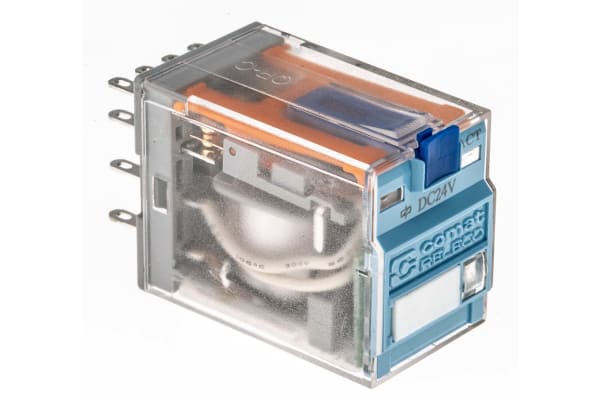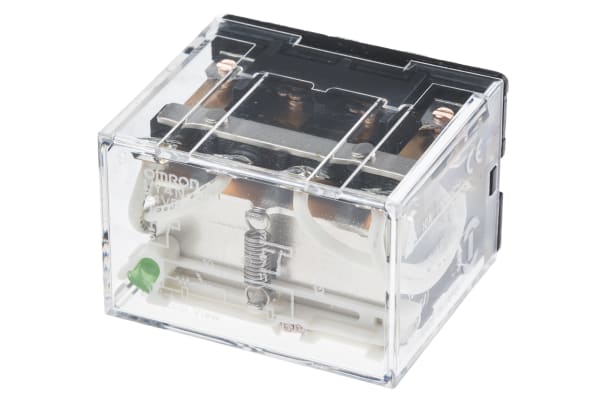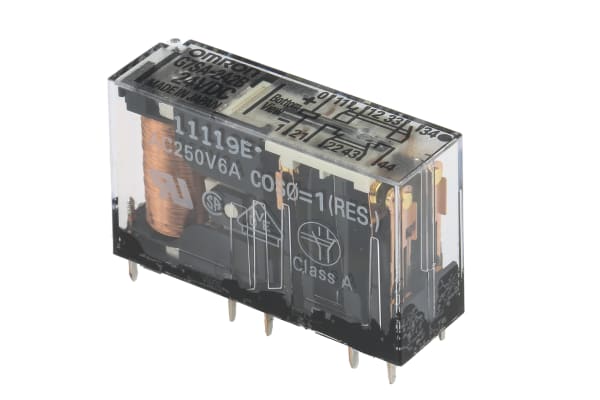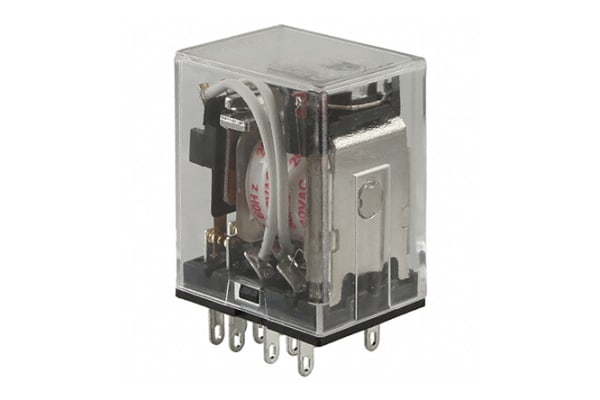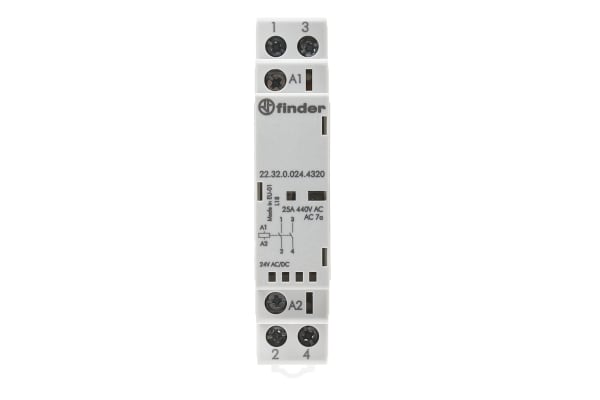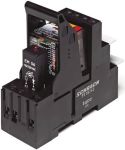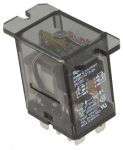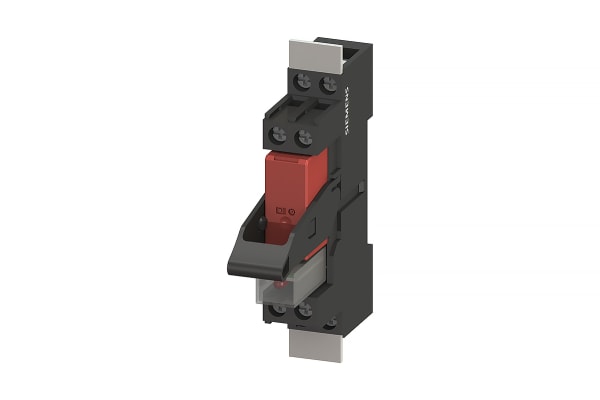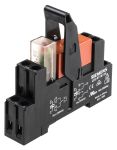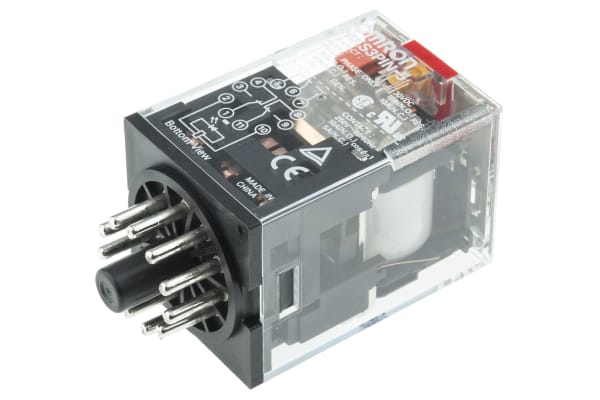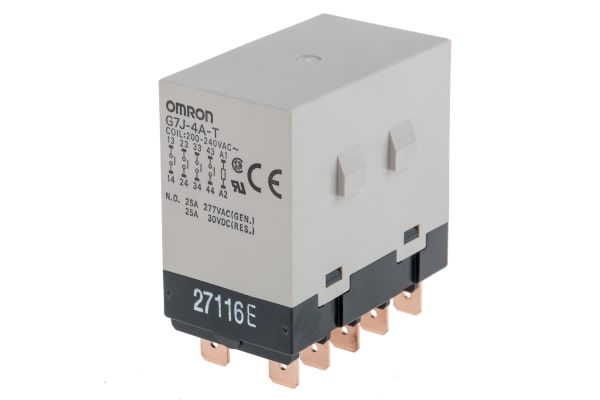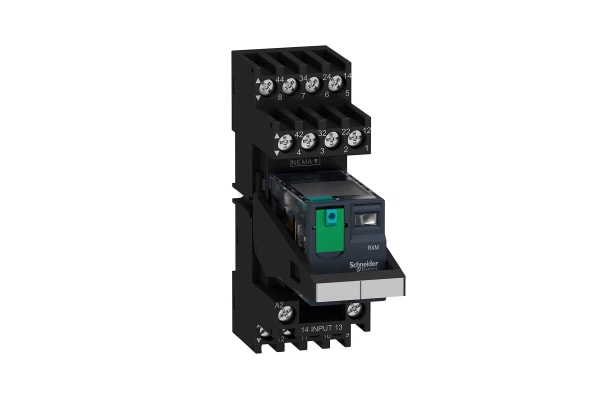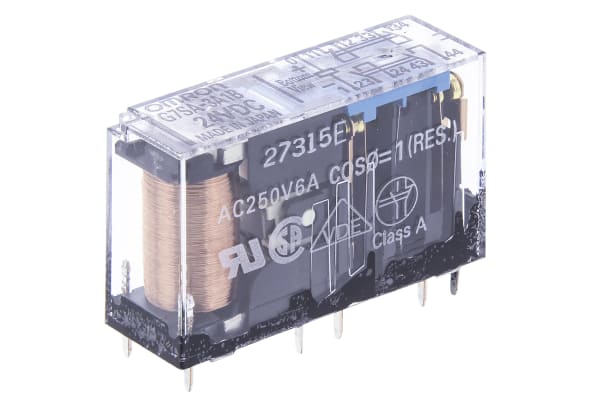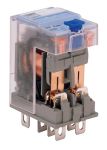Non-Latching Relays
Relays are electrical switches that are operated by electrical impulses with the primary function to open and close a circuit, they can also be referred to as industrial switches. There are 2 main types available, latching and non–latching relays.How do non-latching relays work?Non-latching relays are in a normally closed (NC) position and will stay in this state without power. When power passes through the circuit, the relay switched to a normally open (NO) position by using an internal coil to generate a magnetic force, holding this NO position. Once the current is turned off, it returns to the NC position. This makes non-latching relays well suited to push-button applications like keyboards and micro-controller input buttons.What are non-latching relays used for?Non-latching relays are highly durable and versatile components, making their performance long lasting and suitable for use in a wide range of applications, such as:Automotive enginesHousehold appliancesIndustrial machineryMedical equipmentTelecommunications equipmentWhat is the difference between latching and non-latching relays?Both types of relays in similar in design and function, however, a significant difference between them is that a latching relay will remain in the last position it when it was last powered, whereas a non-latching goes back to its normal position. This makes each more type of relay suitable for different applications. Considerations when selecting a relayWhen choosing a relay, it is important to consider a number of specifications to ensure it is fit for purpose, some factors include:Coil voltage – the required voltage to actuate the switching mechanism. If a voltage is too high this could damage the components, if it is too low then it will not actuate. Contact configuration – This is the state the contacts are in without power. For example SPST, single pole single throw.Contact material – the relay contacts are available in many materials that have certain properties. Common materials are gold, silver, tin oxide and nickel Coil power – the amount of power (watts) the coil operates at. This must match the power in the circuit for correct function. Coil resistance – the amount of resistance (ohms) in the circuit that the coil creates.
-
Turck, 24V dc Coil Non-Latching Relay 4PDT, 5A Switching Current Plug In, 4 Pole, C9-A41FX/024VDC
IDR570,182.04 -
Omron, 24V dc Coil Non-Latching Relay 4PDT, 10A Switching Current Plug In, 4 Pole, LY4N-D2-DC24
IDR464,033.36 -
Finder, 24V ac/dc Coil Non-Latching Relay SP-NO/NC, 25A Switching Current DIN Rail, 2 Pole, 22.32.0.024.4520
IDR605,005.52 -
Finder, 24V dc Coil Non-Latching Relay DPNO, 20A Switching Current DIN Rail, 2 Pole, 22.22.9.024.4000
IDR600,600.14 -
Omron, 24V dc Coil Safety Relay DPDT, 6A Switching Current PCB Mount, 2 Pole, G7SA-2A2B 24DC
IDR605,739.75 -
Honeywell, 220V ac Coil Non-Latching Relay 4PDT, 3A Switching Current Plug In, 4 Pole, SZR-MY4-N1-AC220V
IDR671,925.34 -
Finder, 12V ac/dc Coil Non-Latching Relay DPNO, 25A Switching Current DIN Rail, 2 Pole, 22.32.0.012.4320
IDR642,241.47 -
Finder, 24V ac/dc Coil Non-Latching Relay DPNO, 25A Switching Current DIN Rail, 2 Pole, 22.32.0.024.4320
IDR616,543.42 -
Carlo Gavazzi, 24V dc Coil Non-Latching Octal Relay DPDT, 10A Switching Current Plug In, 2 Pole, RCP800224VDC
IDR211,038.68 -
TE Connectivity, 115V ac Coil Non-Latching Relay 4PDT, 6A Switching Current DIN Rail, 4 Pole, PT5S7SB5 1415366-1
IDR459,627.98 -
TE Connectivity, 24V Coil Non-Latching Relay DPDT, 15A Switching Current Panel Mount, 2 Pole, K10P-11DT5-24
IDR522,981.54 -
Siemens, 24V dc Coil Non-Latching Relay SPDT, 3A Switching Current Plug In Single Pole, LZS:RT3A4L24
IDR368,059.01 -
Honeywell, 24V dc Coil Non-Latching Relay DPDT, 10A Switching Current Plug In, 2 Pole, SZR-LY2-N1-DC24V
IDR635,948.07 -
Schneider Electric, 24V dc Coil Non-Latching Relay 4PDT, 6A Switching Current DIN Rail, 4 Pole, RXM4AB2BDPVS
IDR632,801.37 -
RS PRO 24V ac/dc SPDT Interface Relay Module DIN Rail Mount
IDR836,392.86Pack (1 Pack of 5) -
Siemens, 24V Coil Non-Latching Relay DPDT, 2.5A Switching Current Plug In, 2 Pole, LZS:RT4A4L24
IDR504,520.90 -
Omron, 230V ac Coil Non-Latching Relay 3PDT, 10A Switching Current Plug In, 3 Pole, MKS3PIN5AC230
IDR435,083.72 -
Omron, 240V ac Coil Non-Latching Relay 4PST-NO, 25A Switching Current Panel Mount, 4 Pole, G7J4AT200240AC
IDR730,663.74 -
RS PRO, 36V Coil Non-Latching Relay 4PDT, 2A Switching Current PCB Mount, 4 Pole
IDR797,268.89 -
Schneider Electric, 24V dc Coil Non-Latching Relay 4PDT, 6A Switching Current DIN Rail, 4 Pole, RXM4AB1BDPVM
IDR452,915.02 -
Omron, 24V dc Coil Safety Relay 3PNO, SPNC, 6A Switching Current PCB Mount, 3 Pole, G7SA-3A1B 24DC
IDR642,346.36 -
Panasonic, 24V dc Coil Non-Latching Relay 4PDT, 6A Switching Current PCB Mount, 4 Pole, SF4D-DC24V
IDR613,921.17 -
Turck, 24V dc Coil Non-Latching Relay DPDT, 6A Switching Current Plug In, 2 Pole, C7-T21DX/024VDC
IDR706,014.59 -
Omron, 24V dc Coil Non-Latching Relay DPDT, 25A Switching Current Panel Mount, 2 Pole, G7J-2A2B-BW-1-DC24
IDR645,912.62



